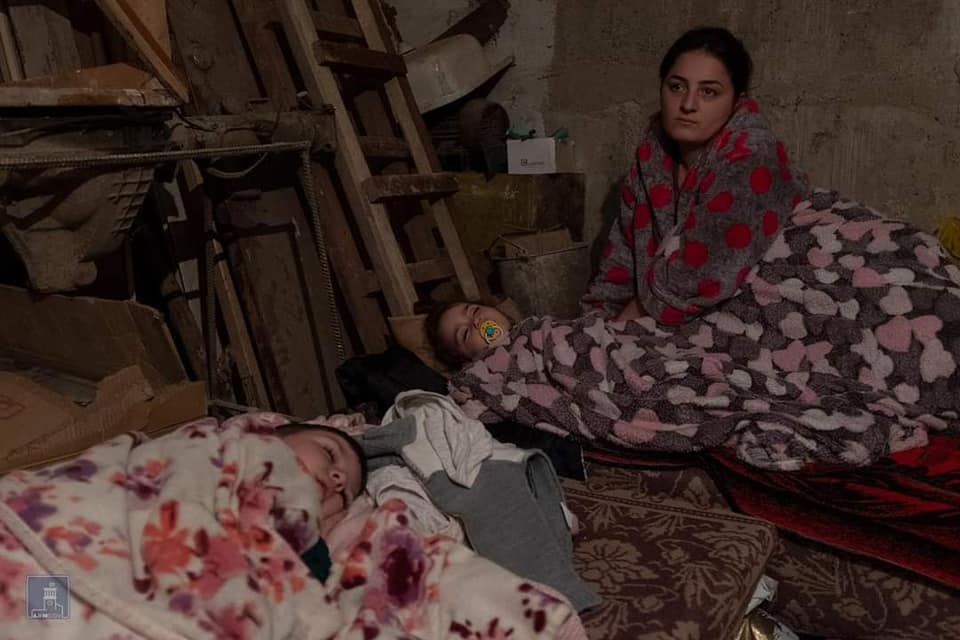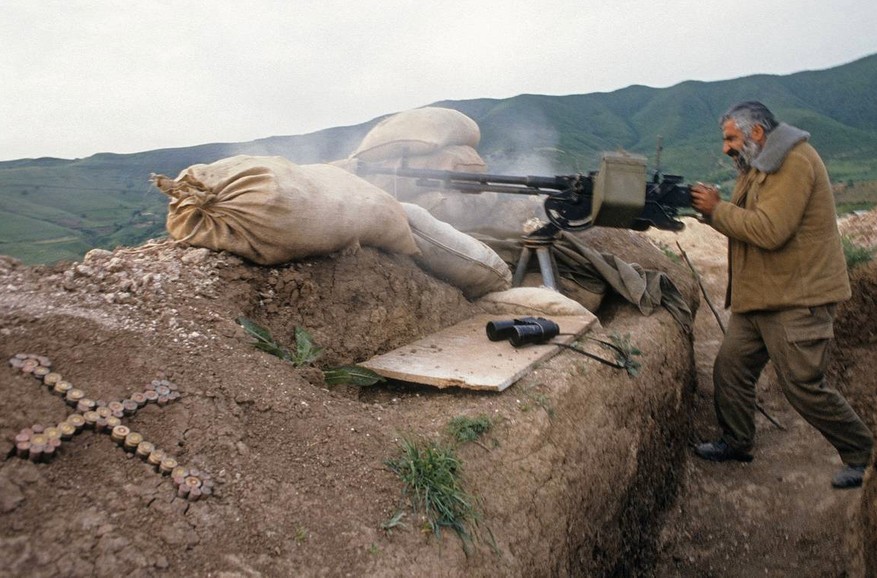"Azerbaijan offers Armenians cultural autonomy, and to wipe them off the face of the earth" – Armenian political scientist
On September 27, 2020, another escalation began in the zone of the Karabakh conflict; more than a thousand deaths among the military and civilians on both sides have been officially confirmed.
Unofficially, the death count is much higher. An armistice agreement has already been signed three times, and each time it has been immediately violated.
Countries not involved in the conflict are trying to understand what is going on – and not only right now.
Foreign politicians, political scientists and journalists have been trying to understand why the Armenian side has not made concessions for all these years after the end of the First Way in Karabakh, realizing the advantage of the enemy in terms of resources and technology. Some believe that they could have conceded to some extent to prevent the so-called Second Karabakh war.
A view from the Armenian side, the opinion of the director of the Caucasus Institute, political scientist Alexander Iskandaryan about the war in Karabakh and its inevitability, the balance of forces for the conflicting sides, why the mediators are powerless, and what victory means for each of the parties to the conflict.
War was inevitable
Azerbaijan has been preparing for this war for about 20 years, since the rise in oil prices. And they were preparing assiduously.
The Armenians, of course, also expected a war; even though estimates of the scale were different, it was impossible not to see the massive preparation for the war.
The sides’ opportunities were asymmetric, high oil prices allowed Azerbaijan to buy weapons in incredible quantities. From Israel alone, they purchased military equipment worth billions of dollars.
Azerbaijan bought drones, trained personnel, trained special forces, bought aviation and artillery, developed combat plans, created formats for interaction with the Turkish military machine, etc. All this cannot be done in a couple of years.
It is superficial to say that some statement or a personal factor caused the war. Preparation and planning for the war began when both Pashinyan and Ilham Aliyev were not significant political figures. The reason for the war is high oil prices, and by no means personalities or any statements.
However, in the 90s, when the first war began, Karabakh was cut off from Armenia, there was no common border, there were no roads. The possibility of delivering goods, including weapons, was only by aviation – by helicopters, which were not common.
The humanitarian situation was extremely difficult. The problem of refugees from Azerbaijan was more than urgent, both in Armenia and in Karabakh, more than every tenth person in the country was a refugee. In addition, in 1988 there was the devastating Spitak earthquake, which led to a humanitarian disaster.
The ratio of resources and technical capabilities in the 90s also differed drastically. According to the Bishkek Agreement, in Azerbaijan and Armenia, as in other countries of the former USSR, with the collapse of the Soviet Union, military equipment should have remained to approximately the same ratios. However, there were actually more weapons on the territory of Azerbaijan than in Armenia, especially in Karabakh. The weapons remained there, meaning military and human resources were asymmetric.
And yet then they managed to stop the war, an armistice agreement was signed.
Karabakh people are also civilians, they cannot be bombed either
Naturally, a propaganda war is going on. As in the theater of the absurd, one can hear and even read that the civilian population can be bombed – more or less – depending on the status of the territory in which it lives, according to the bombers.
Stepanakert is located about 50 km from the hostilities, Ganja is about the same distance. There are military facilities in Ganja; for example, the airport where the F-16 planes were based, whereas, for instance, Shushi doesn’t have any military facilities on its territory.
According to the Geneva Convention, residents should not be bombed at all.
Journalistic ethics aside, one might say that Stepanakert can be bombed because its residents are used to it.
Firstly, since 1994, no one has bombed Stepanakert, just like Ganja, so at least young Stepanakert residents could not acquire this kind of habit.
Secondly, why is bombing those who are used to it ‘completely different’? Allusions to racism just suggest themselves. [Iskandaryan is reacting here to the opinion of Kommersant correspondent Kirill Krivosheev: “It’s one thing to shoot at the city, where people are generally accustomed to war. And quite another – in residential areas 50 kilometers from the front line, where the war has been seen only on TV.”]
In this war, not only military targets are bombed – civilians are also bombed mainly by Azerbaijanis, because peaceful people live in Stepanakert, Martakert, Hadrut, Martuni, etc. And just because these civilians are Karabakh people, it does not qualify them as soldiers.
Azerbaijan refuses to compromise
The official parties to the conflict positioned themselves differently even before the war, during the negotiations. Armenia, for example, initially agreed to a compromise solution. The talks revolved around the Madrid principles, the idea of which is precisely a compromise.
The Madrid principles had the status of the territories divided into two parts:
• part of these territories should have been returned to Azerbaijan, the other part – not
• as for territories that are not returned, Azerbaijan was to recognize the status as a result of a plebiscite
What Azerbaijanis have always proposed – both then and now – is a complete absence of compromise.
They demanded a return to the situation that existed before 1988, i.e. autonomy within Azerbaijan, and called it a compromise. This is the very situation that led to the conflict. And after that there was a war.
It is also noteworthy that Azerbaijan itself canceled even the autonomy for Nagorno-Karabakh. From the legal point of view of Azerbaijan, NKAO [Nagorno-Karabakh Autonomous Oblast] has not existed since Soviet times.
On November 26, 1991, the Supreme Council of Azerbaijan proposed a radical solution to the conflict. They abolished NKAO and changed the name of Stepanakert to Khankendi.
For comparison, from the Georgian point of view, Abkhaz autonomy exists, and they are ready to provide it if the Abkhaz agree to it. From the point of view of Azerbaijan, there is no NKAO, there are just some regions on its territory.
If Azerbaijan was really ready to grant broad autonomy to Karabakh, what prevented it from introducing this autonomy into the Constitution? Why didn’t it bother to explain what it is, what powers can be implied? Azerbaijan didn’t do any of this.
The Azerbaijani position has always been uncompromising, and this position was clearly demonstrated for the last time in Kazan in 2011, when they refused to compromise on the conflict.
After Kazan, there were no serious substantive negotiations. The talks were not about the settlement of the conflict itself, but about how to live in the conflict: security measures, reduction of incidents at the border and their investigation. The parties were engaged not in the settlement, but in the management of the conflict.
Mediators are powerless due to Azerbaijani and Turkish ambitions
It is not surprising that the mediators are now unable to stop the war. They cannot succeed because Azerbaijan and Turkey do not have such motives; instead, they want to solve the problem by military means.
In the 90s, the war was stopped as it dwindled. One of the sides achieved the appropriate borders, the other did not have the strength to fight.
At first, before the talks in Key West, it was thought that the problem could be resolved through concessions, and from the very beginning the areas around the NKAO were called the ‘security zone’. But this did not work out due to the lack of desire in Azerbaijan itself. And these territories have really become an empty security zone.
Then Azerbaijan began to prepare for war, and Aliyev began to speak about this quite frankly, and the co-chairs always ran into Azerbaijan’s unwillingness to resolve the issue through compromises. In this regard, the Armenian positions also toughened.
Azerbaijan is often reminded of the UN resolutions adopted on the Karabakh conflict. UN resolutions speak of the cessation of hostilities, and they have not been implemented by Azerbaijan from the very beginning of these hostilities.
The main principle of any international formats for resolving a conflict is to resolve it exclusively by peaceful means.
It is incredibly difficult to talk about the joint life of Armenians and Azerbaijanis precisely because of the wars and violence, including fighting against the civilian population. There are very few people of Azerbaijani nationality in Karabakh. According to the official census, there are less than a dozen of them. The war and propaganda of ethnic hatred in Azerbaijan severely limits any possibility of co-living.
The failure of the proposal for cultural autonomy
Until the Second Karabakh War, the NKR lived, developing quite decently – the population increased after the first war. The country was practically destroyed in the early 90s. After that, it was actively rebuilt, infrastructure was built, the population worked, agriculture developed, factories, power plants, and housing were built.
According to the Azerbaijani agitprop, Azerbaijan is fighting to restore its territorial integrity, in which its own citizens of Armenian nationality will live and have cultural autonomy there.
What do we see in practice? When the Azerbaijani army occupies Armenian villages, they are burnt and destroyed. Why kill your civilians and burn your villages? The very people who in the future should experience the joy of cultural autonomy in those very ruined villages?
The value of victory for the parties to the conflict
Karabakh is at war, including with Turkey. The factor of Turkey in the Karabakh conflict has always existed. Turkey has always backed up Azerbaijan in one form or another, but it has never participated in the conflict so frankly, so prominently, so demonstratively and directly as now.
Now, in fact, it participates in the conflict in an extremely multifaceted manner – from planning to armaments, sometimes direct control of operations.
For Artsakh [the Armenian self-name of Nagorno-Karabakh], this is truly an existential war. In the sense that stopping hostilities by Azerbaijan means peace, and stopping hostilities by Karabakh means allowing itself to be destroyed, i.e. genocide.
The victory of the Karabakh people in this war is not the capture of the city of Baku or any other city. They need to withstand, survive, keep the ability to live in their homes.




















